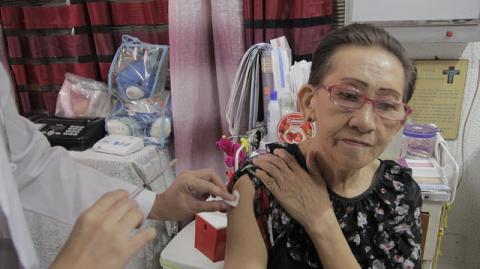Elderly and vaccination

Persons over the age of 65 have a higher risk for severe influenza-related complications and have the highest risk of mortality from influenza. Vaccination of older persons have traditionally been the main focus of influenza vaccine policy, and while vaccines are not as efficient in this population as in younger adults, it still remains the most effective public health tool to protect against influenza (WHO 2012). Vaccination recommendations vary slightly between countries in Europe, however almost all cover older people as a specific target group (Endrich et al 2009).
Among the over-65 group, those aged 75 years and over were more likely to vaccinate against influenza than those aged 65 to 74 years (Nagata et al 2011). Older people who suffer from a chronic disease or use medical services more frequently are more likely to get vaccinated (ECDC 2013). Women live longer than men, and women’s life expectancy has increased faster than that of men (Keskinoglu et al 2007). The increased frailness that comes with old age and the increase in ill health is thus a female problem by virtue of female longevity - for example, more women than men have dementia as the chief risk factor for developing dementia is old age (Cahill, O’Shea and Pierce 2012).
In their wide-ranging and resourceful review of age and gender, Davidson et al (2011) list a large number of issues concerning ageing women, referring to it as the feminisation of ageing. They found that women in general, and older women in particular, are underrepresented in clinical trials and research, thereby hindering any development of sex-specific treatments or policy guidelines. They call on more inclusive clinical research, as well as more research and data collection on older women’s health in general.
Another way in which older women are at a disadvantage is widowhood. Davidson et al argue that widowhood has the potential to adversely affect a women’s physical and mental health, in addition to health behaviours. The loneliness and depression that may accompany widowhood can lead to increased risk of physical and psychological illness, as well as the emotional toll the older widow may also find herself at a worse financial status due to the loss of spousal income (2011). In an Italian study, windowed and single persons over 65 years old were found to have a lower probability of receiving an influenza vaccination, compared to other persons in their age group (Damiani et al 2007).
Mamelund and Riise Bergsaker (2011) state that as mortality is higher for men than for women, more older women than men live in one-person households. They do not have the advantages that come with social support, and may therefore have a lower likelihood of being vaccinated for seasonal influenza. Their findings show that among married people, older women are active in ensuring their husband gets the influenza vaccine. They also found that older women getting the influenza vaccine were not dependent on their husband’s prior history of vaccination, which was the case for males. However, Mamelund and Riise Bergsaker did not discuss whether this health-seeking behaviour continued when the woman had become a widow.
These gender-based issues are highly relevant in regards to help-seeking behaviour and the vulnerability of older people in general and women in particular of ill health. While Damiani et al (2011) found that socioeconomic differences in influenza vaccination existed among adults in Italy but not among those over 65 years of age, the fact that older people are a major risk group for influenza still remains.
References
Cahill S, O’Shea, E., Pierce, M. (2012) Creating Excellence in Dementia Care A Research Review for Ireland’s National Dementia Strategy, Dublin and Galway: DSIDC, St James’s Hospital, Trinity College Dublin and ICSG, NUI Galway.
Damiani, G., Federico, B., Visca, M., Agostini, F., and Ricciardi, W. (2007) ‘The impact of socioeconomic level on influenza vaccination among Italian adults and elderly: A cross-sectional study’, Preventive Medicine, 45(5), 373-379.
Davidson, P.M., DiGiacomo, M., and McGrath, S.J. (2011) ‘The feminization of aging: how will this impact on health outcomes and services?’ Health Care for Women International, 32(12), 1031-1045.
Endrich, M.M., Blank, P.R., and Szucs, T.D. (2009) ‘Influenza vaccination uptake and socioeconomic determinants in 11 European countries’, Vaccine, 27(30), 4018-4024.
European Centre for Disease Prevention and Control (2013) Review of scientific literature on drivers and barriers of seasonal influenza vaccination coverage in the EU/EEA, Stockholm: ECDC.
Keskinoglu, P., Ucuncu, T., Yildirim, I., Gurbuz, T., Ur, I., and Ergor, G. (2007) ‘Gender discrimination in the elderly and its impact on the elderly health’, Archives of Gerontology and Geriatrics, 45(3), 295-306.
Mamelund, S-E, Riise Bergsaker, M.A. (2011) ‘Vaccine history, gender and influenza vaccination in a household context’, Vaccine, 29(51), 9441-9450.
Nagata, J.M., Hernández-Ramos, I., Sivasankara Kurup, A., Albrecht, D., Vivas-Torrealba, C., and Franco-Paredes, C. (2011) ‘Social determinants of health and seasonal influenza vaccination in adults >65 years: a systematic review of qualitative and quantitative data’, BMC Public Health, 13(388), 1-25.
World Health Organisation (2012) Vaccines against influenza WHO Position Paper, Geneva: World Health Organisation.
